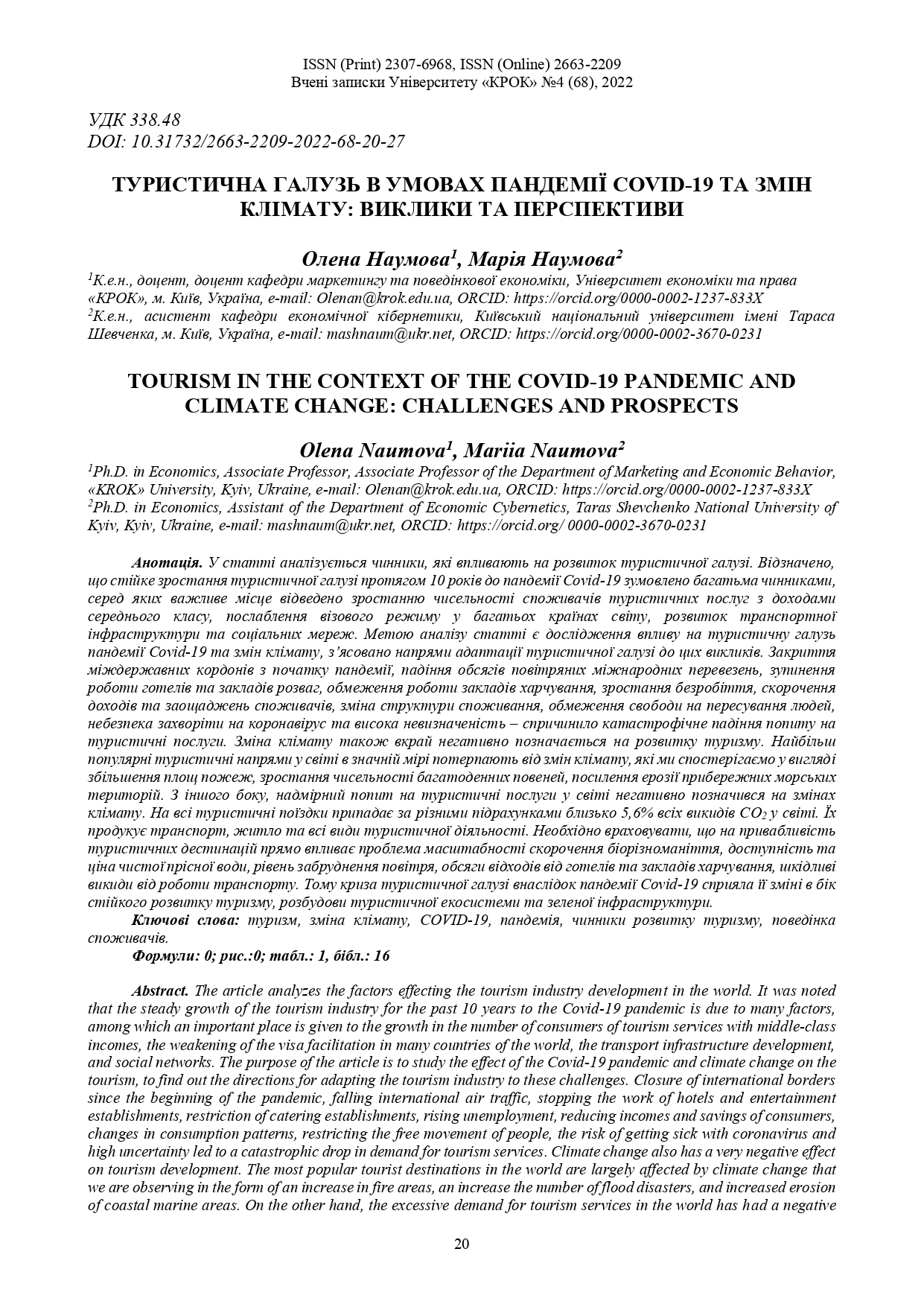TOURISM IN THE CONTEXT OF THE COVID-19 PANDEMIC AND CLIMATE CHANGE: CHALLENGES AND PROSPECTS
DOI:
https://doi.org/10.31732/2663-2209-2022-68-20-27Keywords:
tourism, climate change, COVID-19, pandemic, tourism development factors, consumer behaviorAbstract
The article analyzes the factors effecting the tourism industry development in the world. It was noted that the steady growth of the tourism industry for the past 10 years to the Covid-19 pandemic is due to many factors, among which an important place is given to the growth in the number of consumers of tourism services with middle-class incomes, the weakening of the visa facilitation in many countries of the world, the transport infrastructure development, and social networks. The purpose of the article is to study the effect of the Covid-19 pandemic and climate change on the tourism, to find out the directions for adapting the tourism industry to these challenges. Closure of international borders since the beginning of the pandemic, falling international air traffic, stopping the work of hotels and entertainment establishments, restriction of catering establishments, rising unemployment, reducing incomes and savings of consumers, changes in consumption patterns, restricting the free movement of people, the risk of getting sick with coronavirus and high uncertainty led to a catastrophic drop in demand for tourism services. Climate change also has a very negative effect on tourism development. The most popular tourist destinations in the world are largely affected by climate change that we are observing in the form of an increase in fire areas, an increase the number of flood disasters, and increased erosion of coastal marine areas. On the other hand, the excessive demand for tourism services in the world has had a negative effect on climate change. All tourism travel accounts for around 5.6% of all CO2 emissions in the world, according to various estimates. They are produced by transport, accommodation, and all types of tourism activities. It should be considered that the attractiveness of tourist destinations is directly affected by the scale of the biodiversity reduction problem, the availability and price of clean fresh water, the level of air pollution, the amount of waste from hotels and catering establishments, and harmful emissions from transport. Therefore, the crisis in the tourism industry as a result of the Covid-19 pandemic has contributed to its change towards sustainable tourism development, the development of the tourism ecosystem, and green infrastructure.
Downloads
References
Scott D., Gössling S. A review of research into tourism and climate change-Launching the annals of tourism research curated collection on tourism and climate change. Annals of Tourism Research. 2022. No. 95. URL: https://www.sciencedirect.com/science/article/abs/pii/S0160738322000603 (date of access: 13.12.2022).
Ebi K. L., Frumkin H., Hess J. J. Protecting and promoting population health in the context of climate and other global environmental changes. Anthropocene. 2017. No. 19. P. 1–12. URL: https://doi.org/10.1016/j.ancene.2017.07.001 (date of access: 12.12.2022).
Detecting and attributing health burdens to climate change / K. L. Ebi et al. Environmental Health Perspectives. 2017. No. 125(8). URL: https://doi.org/10.1289/EHP1509 (date of access: 12.12.2022).
A review of tourism and climate change mitigation: The scales, scopes, stakeholders and strategies of carbon management. / S. Gössling et al. Tourism Management. 2023. No. 95. URL: https://www.sciencedirect.com/science/article/pii/S0261517722001947?via=ihub (date of access: 13.12.2022).
Peeters P. Tourism’s impact on climate change and its mitigation challenges: How can tourism become ‘climatically sustainable’?: Doctoral Thesis. Netherlands, 2017. 343 p. URL: https://doi.org/10.4233/uuid:615ac06e-d389-4c6c-810e-7a4ab5818e8d (date of access: 08.12.2022).
Carbone F. Tourism destination management post COVID-19 pandemic: a new humanism for a human-centred tourism (tourism 5.0). Turismo Mundial, Crise Sanitária e Futuro: visões globais partilhadas/World Tourism, Health Crisis and Future: sharing perspective, Tomar, Portugal: Instituto Politécnico de Toma. 2020. P. 43–55.
Global Economic Impact Reports. World Travel & Tourism Council. URL: https://wttc.org/research/economic-impact (date of access: 13.12.2022).
International tourism, number of arrivals. World Tourism Organization, Yearbook of Tourism Statistics, Compendium of Tourism Statistics and data files. URL: https://data.worldbank.org/indicator/ST.INT.ARVL (date of access: 10.12.2022).
World Tourism Organization (UNWTO). URL: https://www.unwto.org/ (date of access: 10.12.2022).
Number of international tourist arrivals worldwide from 1950 to 2021. Statista Inc. URL: https://www.statista.com/statistics/209334/total-number-of-international-tourist-arrivals/ (date of access: 08.12.2022).
Tourism back to 1990 levels as arrivals fall by more than 70%. UNWTO. URL: https://www.unwto.org/news/tourism-back-to-1990-levels-as-arrivals-fall-by-more-than-70 (date of access: 12.12.2022).
Policy Brief: COVID-19 and Transforming Tourism. World Tourism Organization (UNWTO). URL: https://unsdg.un.org/sites/default/files/2020-08/sg_policy_brief_covid-19_tourism_august_2020.pdf (date of access: 12.12.2022).
Behsudi A. For Maldives Environment Minister Aminath Shauna, fighting climate change is an existential battle. International Monetary Fund. URL: https://www.imf.org/Publications/fandd/issues/2021/09/maldives-climate-change-aminath-shauna-trenches (date of access: 12.12.2022).
Making Tourism More Sustainable - A Guide for Policy Makers. UNWTO, 2005. 212 p. URL: https://www.e-unwto.org/doi/book/10.18111/9789284408214 (date of access: 10.12.2022).
Climate Change: Global Issues. United Nations. URL: https://www.un.org/en/global-issues/climate-change (date of access: 09.12.2022).
The Paris Agreement. United Nations Climate Change. URL: https://unfccc.int/process-and-meetings/the-paris-agreement/the-paris-agreement (date of access: 09.12.2022).

Downloads
Published
How to Cite
Issue
Section
License
Copyright (c) 2022 Олена Наумова, Марія Наумова

This work is licensed under a Creative Commons Attribution 4.0 International License.

